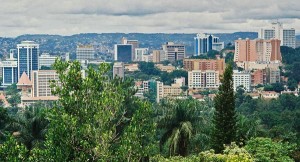Drafting Greater Kampala economic plan underway

Some 30% of Uganda’s annual wealth is generated in and around Kampala which accommodates only 10% of the total national population.
March 13, 2018—Greater Kampala accounts for only about 10% of Uganda’s population, but the surrounding settlements of Uganda’s capital, generate a third of the country’s Gross Domestic Product (GDP) of about $25 billion and employ 46% of its formal workers.
According to a recent World Bank report titled “From Regulators to Enablers: Role of City Governments in Economic Development of Greater Kampala’, to underscore the area’s multiplier effect for the rest of the country, every dollar invested in food processing in the capital city results in an estimated increase in consumption of 0.58 cents for people within Greater Kampala, and 0.63 cents for people in the rest of the country.
Sameh Wahba, the World Bank Director, Urban and Territorial Development and Disaster Risk Management said, “There is need for policy makers to take a long-term view of development of Greater Kampala–so that investments are structured to take into account the long-term development of the city. To do this, it is critical that the city governments that make up the Greater Kampala Metropolitan Area (GKMA) work together to make the Greater Kampala a productive as well as liveable city.”
The report recommends four main strategies beginning with investing in transport and economic infrastructure, such as roads and markets, to improve access within the city and to markets. Second, land use management be done in partnership with large landowners to facilitate access to land for local enterprises.
Third is partnering with the private sector to provide support services to local firms such as tax education and skills development; and finally establishing a Greater Kampala Working Group to convene stakeholders and marshal political support.
The government is currently finalising preparation of an Economic and Development Strategy for the Greater Kampala under the leadership of the National Planning Authority.
The World Bank says like many other metropolitan cities, Kampala’s future depends on the prosperity of the secondary and tertiary towns around it. Working together, these local governments, notably, Wakiso, Mukono and Mpigi districts together with the Kampala Capital City Authority can mobilise capital to finance coordinated infrastructure investments across the GKMA for greater impact.
Christina Malmberg Calvo, the World Bank Country Manager in Uganda said,“Over two-thirds of Greater Kampala’s businesses are informal. Local governments need to enable small and micro-entrepreneurs to access affordable, well-located land and premises, and provide public transport to link people with jobs and enterprises with customers.”
Central Kampala has a large daily commuter population segment that is mostly involved in informal business.


 African Heads of state head to South Korea next week for Summit talks
African Heads of state head to South Korea next week for Summit talks
 Trading leads as main source of income for Ugandans
Trading leads as main source of income for Ugandans
 New leadership for bankers’ umbrella as total assets top $12 billion
New leadership for bankers’ umbrella as total assets top $12 billion
 Brussels Airlines to announce Nairobi service
Brussels Airlines to announce Nairobi service
 SITA promises enhanced travel experience after Materna acquisition
SITA promises enhanced travel experience after Materna acquisition
 Saudia’s 105 aircraft order stretches A320neo lead over rival Max
Saudia’s 105 aircraft order stretches A320neo lead over rival Max
